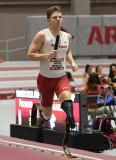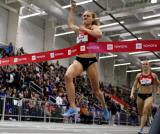Folders |
Easton Allred Back Up To Speed After October Surgery To Address Rare Medical ConditionPublished by
BYU Freshman Regains Optimism After Mystery Ailment Diagnosed As Median Arcuate Ligament Syndrome By Theresa Juva Brown for DyeStat Distance runner Easton Allred distinctly remembers the first time he noticed something was wrong with his body. Right after cruising to an impressive 8-kilometer victory against college-aged runners at the Road Runners Invitational in Denver on Oct. 6, 2018, Allred, then 17, suddenly felt sick. “I basically thought that I had the flu. I was just incredibly nauseous, tired and anxious. I was also having a hard time breathing,” Allred said. Even after staying in bed, he couldn’t shake the awful symptoms. Still, determined to run the national meets he was eligible for, the Mountain Vista CO junior finished second at the Nike Cross National Southwest Regional to qualify for Nike Cross Nationals. There, he took fifth place against the best high school boys in the country, a stunning performance that caught the attention of his future coach, Ed Eyestone, a legendary two-time Olympian who directs the top-notch men’s cross country program at Brigham Young University. “Taking the lead with 600 to go at (Nike Cross Nationals) your junior year is a sign of grit and of world class-potential,” Eyestone said. But that thrilling race was just a brief reprieve for Allred. “I was lucky to feel well during the race,” he said. “Before that weekend and after, I felt terrible.” Agony With No Answer The fall of 2018 was only the beginning of Allred’s perplexing two-year battle with debilitating anxiety and nausea that left doctors grappling for explanations. Allred, an outgoing teenager who published a self-help book when he was 16, took college classes and hosted a podcast and his own YouTube channel, found himself frequently paralyzed by nausea, dry heaving and anxiety, which made him withdraw. “Going to school, church, or really anything, was miserable — I wanted to throw up anywhere I went,” he wrote in a recent essay for The Oval Magazine titled “Running Through Hell.” “If you have ever been car sick and wanted to hurl out the window, it was that level of nausea that I would experience everyday. It ripped me apart.” In addition to the agonizing nausea, Allred struggled with a series of injuries his junior year, first an IT band injury that required surgery and then a stress fracture in his foot. He also transferred schools and moved to a new state after the 2018 cross country season, landing at Corner Canyon High in Utah. Allred went into his senior year still mending from the injuries and knowing he probably wouldn’t achieve his dream of becoming a national cross country champion. Still, he forged ahead and managed to finish fifth at the Utah State Cross Country Championships and help Corner Canyon capture the state title in one of the most dominating team performances in meet history. Afterwards, Allred revealed on Instagram that he almost didn’t compete. “Waking up yesterday I was sick as a dog and thought I was going to have to back out of running our state championship,” he wrote. “Instead I got to be a part of history. Corner Canyon put 4 guys in the top 5 in the STATE to win with the lowest 6A score in Utah history. Feeling very blessed to end up here.” A few weeks later, Allred excitedly announced on social media he would join BYU’s distance squad, which won the NCAA Division 1 Cross Country Championship that fall. But he was also scared. After finishing 38th at Nike Cross Nationals in December and helping his team take third, Allred reflected on the year in an Instagram post on New Year’s Day 2020. Despite his successes, “I’ve been at a mental and physical breaking point countless times this year, and it’s undoubtedly been the hardest year of my life,” he wrote. Searching For Answers As 2020 unfolded with no symptom relief and no clear answers, Allred grew more despondent. “I couldn’t bear to hear yet another doctor ask me the same questions and ultimately tell me it was in my head,” he wrote in his Oval Magazine essay. A series of doctors attributed his symptoms to an anxiety disorder, a conclusion that never felt right to Easton’s mother, Lori Allred, who had to convince Easton’s father and her husband, an orthopedic surgeon, that they needed to keep searching for answers. “You trust your instinct when you know something isn’t right,” she said. At the suggestion of her friend, Lori Allred convinced her son last spring to see Dr. Craig Coleby, an internal medicine, pediatric and sports medicine physician in Riverton, Utah. Allred's pain would finally get a name. “Within five minutes of talking, I was diagnosed with a rarely understood condition of renal vein compression,” Allred recalled. “This actually ended up being one of several vein compressions causing my anxiety and constant nausea, but for the first time in a very long time, I had hope.” For his mother, the diagnosis validated her intuition. “It was such a gift that we went in on that day and saw that doctor,” she said. “It absolutely changed the course of Easton’s life.” Allred was ultimately diagnosed with Median Arcuate Ligament Syndrome. Known as MALS, the rare condition occurs when the ligament at the bottom of the diaphragm presses too tightly against the celiac artery — a major branch of the aorta — that supplies blood to the stomach and other gut organs. The compression causes damage to the area’s nerves, producing signals to the brain that are interpreted as pain, anxiety and chronic nausea. After months of failed medications and a trip to Germany to meet one of the world’s leading MALS experts, Allred was told he would need abdominal surgery. On Oct. 6, 2020, exactly two years after Allred suffered his first episode at the Road Runners Invitational, he underwent laparoscopic robotic assisted surgery, which involved slicing part of the diaphragm and cutting back damaged nerves to release pressure around the celiac artery. The recovery usually takes about six months, but can take up to a year.
“The week of surgery I couldn’t get out of bed much, but the second week I taped my swollen belly up and was hitting the roads again," he said. “For the first month or so, I was limited to running only three miles a day to allow my body to heal.” Since the surgery, Allred said his anxiety and nausea have significantly eased and he’s slowly, but happily, regaining his running fitness. He’s currently running 65 miles a week and recently ran 8:23 in a 3,000-meter time trial at altitude. “I still have pains, for sure, but it’s not even close to what it was before,” he said. “I feel so much better and there is still healing to be had, too, which is exciting.” Eyestone, who Allred said has been enormously supportive throughout his ordeal, is astonished by Allred’s recovery so far. “He has progressed to the point that if the conference meet were held tomorrow, he would be toeing the line,” he said. “That is saying something for a BYU team that is considered one of the deepest teams in the country year in and year out." In addition to his exceptional talent and work ethic, Allred is a great teammate, he said, and the team has rallied around him. "I think there is no better balm of healing and recovery than good teammates,” Eyestone said. “Easton has that here at BYU. I have let him know that his place is secure and that with consistency, the cream eventually rises to the surface. His success is inevitable.” A Renewed Purpose As he holds steady in his recovery, Allred, who holds a personal best of 4:05 in the mile, is setting big goals again. He hopes to make the BYU team that competes in March at the NCAA Division 1 Cross Country Championships at Oklahoma State, which was postponed from the fall due to COVID-19. “If I can do that, I would love to finish All-American and be on par with the top freshmen in the country,” he said, adding that he hopes to also qualify for nationals in track. Lori Allred puts his current recovery at about 85 percent and said she’s hopeful her son won’t need additional surgeries in the future. As a mother who fought for so long to get answers, Lori feels immeasurable joy and relief these days. “It’s just really fun to see him dreaming and feeling like he’s going to have a future,” she said. With his body healing, Allred, 19, also recognizes his emotional transformation. He’s more empathetic to the struggles of others, doesn’t take good health for granted and appreciates his loved ones more than ever. “I am so grateful for my family," he said. "My mom has been what I consider to be a ninja throughout the whole journey. She has never given up on trying to find a solution, even when I myself thought I never would.” More news |









